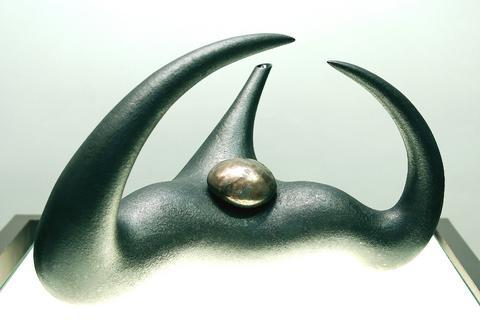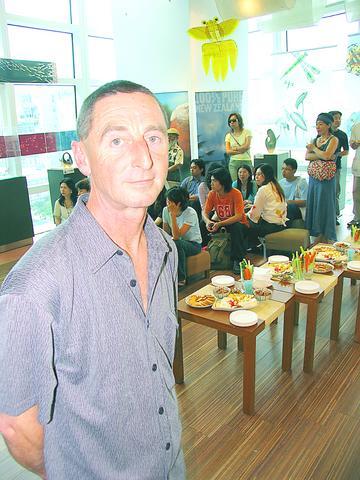"I'm a studio potter, we're a down-to-earth lot," said New Zealand artist Rick Rudd yesterday at the opening of his exhibition in Page One's Taipei 101 store in the Xinyi district.
"We're not really in the same class as artists like Hans Coper and Lucie Rie. They're the gods of European potters. Bernard Leach, I suppose, covered the Japanese and Asian themes. I guess I see myself in the European tradition," Rudd said, though he is from the Asia-Pacific region.

PHOTO COURTESY OF PAGE ONE
Originally from Great Yarmouth in England, Rudd was a fine-arts student before getting his hands on clay for the first time at the age of 19. It was love at first feel.

PHOTO: JULES QUARTLY, TAIPEI TIMES
"Once I touched clay that was it, I couldn't live without it. It's so malleable. It has its difficulties but that suggests solutions. It's such a lovely material to work with, sometimes soft, it hardens up like chocolate and can be refined."
Rudd's ceramics tutor at college gave him his first insights into the craft and then came the next life-altering decision, to check out New Zealand.
"It was a good move," he said, explaining that the country was a fine place for potters at the time. "There was a pot shop on every corner and pottery was popular and would sell."
For the past 31 years Rudd has developed his craft in his adopted country, moving on from the boxes he first crafted out of clay, where three-dimensional heads (usually of zoo animals such as gorillas) morph from the flat
surfaces.
In the late 1970s and early 1980s, Rudd started producing plaques featuring matinee idols like Fred Astaire, Ginger Rogers and Marilyn Monroe. This was his "showbiz era," when he was invited to Hollywood and produced a radio talk show.
In the mid-1980s Rudd returned to modeling primate heads, before moving onto sculpting out male and female torsos that were "trapped" or formed from rising columns of clay.
In my view, however, some of these efforts seem subsidiary to the main body of his work that began with simple bowls and developed into plates, teapots and aesthetically pleasing shapes that have no utilitarian function whatsoever.
These form the main collection of items that are on show at Page One and which are also on sale, from under NT$30,000 to around NT$70,000.
Rudd has been producing these more conceptual pieces since 1969, but they have steadily evolved and become sublime in the process. The trademark curves in his works, for instance, later became mobius twists after he thought to himself, "What if a spiral met up with itself?"
"These shapes evolve. When I start a piece, it's in my head, there's no drawing at all, just a gradual evolution of form," he said.
And this is the most appealing element of Rudd's work, which has been produced largely following the modified raku technique -- removing red-hot pots from the kiln and smoking them in sawdust to get a dark, earthen look, that has become a signature mark of his wares.
In addition he has used various glazes, some of which crack and separate into globules and fissures, again giving the finished product a natural feel. Other innovations include "drilled holes," contrasting under-glaze colorations and bold splashes of primary colors.
Rudd does not label his wares, preferring instead for the viewer to provide a meaning for the work. He is keener on discovering the possibilities of form rather than finding inspiration from nature.
Rudd has used the line himself and it is apt: True to form rather than nature. It is this focus that makes him not just a studio potter, but a ceramicist of note.

On April 26, The Lancet published a letter from two doctors at Taichung-based China Medical University Hospital (CMUH) warning that “Taiwan’s Health Care System is on the Brink of Collapse.” The authors said that “Years of policy inaction and mismanagement of resources have led to the National Health Insurance system operating under unsustainable conditions.” The pushback was immediate. Errors in the paper were quickly identified and publicized, to discredit the authors (the hospital apologized). CNA reported that CMUH said the letter described Taiwan in 2021 as having 62 nurses per 10,000 people, when the correct number was 78 nurses per 10,000

As we live longer, our risk of cognitive impairment is increasing. How can we delay the onset of symptoms? Do we have to give up every indulgence or can small changes make a difference? We asked neurologists for tips on how to keep our brains healthy for life. TAKE CARE OF YOUR HEALTH “All of the sensible things that apply to bodily health apply to brain health,” says Suzanne O’Sullivan, a consultant in neurology at the National Hospital for Neurology and Neurosurgery in London, and the author of The Age of Diagnosis. “When you’re 20, you can get away with absolute

May 5 to May 11 What started out as friction between Taiwanese students at Taichung First High School and a Japanese head cook escalated dramatically over the first two weeks of May 1927. It began on April 30 when the cook’s wife knew that lotus starch used in that night’s dinner had rat feces in it, but failed to inform staff until the meal was already prepared. The students believed that her silence was intentional, and filed a complaint. The school’s Japanese administrators sided with the cook’s family, dismissing the students as troublemakers and clamping down on their freedoms — with

As Donald Trump’s executive order in March led to the shuttering of Voice of America (VOA) — the global broadcaster whose roots date back to the fight against Nazi propaganda — he quickly attracted support from figures not used to aligning themselves with any US administration. Trump had ordered the US Agency for Global Media, the federal agency that funds VOA and other groups promoting independent journalism overseas, to be “eliminated to the maximum extent consistent with applicable law.” The decision suddenly halted programming in 49 languages to more than 425 million people. In Moscow, Margarita Simonyan, the hardline editor-in-chief of the